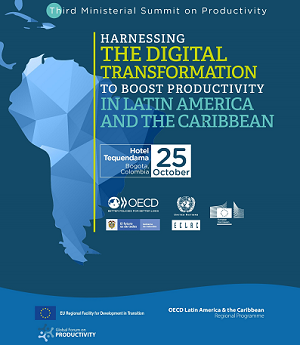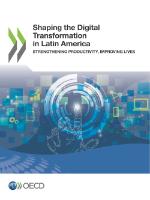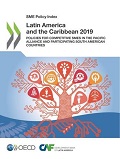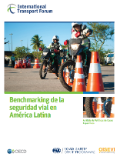Boosting Productivity in LAC
The OECD Regional Programme (LACRP) has been a key player in fostering the discussion on productivity and policy reforms to boost growth in the LAC countries. Although the LAC region has registered a relatively dynamic growth over the last two decades, it has not been as rapid as that of other emerging economies. This goes back to the need to strengthen specific regional connectivity dimensions, but also the need to unlock the potential of companies, introduce better technologies and provide a solid framework for education and the development of skills. The LACRP responds to these challenges by providing policy makers with fresh evidence and examples of good policy practice from across world.
Since its creation of the programme, the LACRP has been holding annual high-level meetings that are supported by a regional publication focusing on one of the programmes’ three thematic areas. A first Ministerial Summit on “Productivity and Inclusive Growth," which was co-organised with the IDB and the OECD’s Global Forum on Productivity and held in 2016 in Santiago de Chile, gathered more than 250 policy makers and high-level participants from across the region.
In the coming years, the Programme will also focus on supporting the region in seizing the potential of the digital economy and connectivity to unlock productivity growth.
Third LACRP Ministerial Summit on Productivity
25 October | Bogota, Colombia
Key Publication
Shaping the Digital Transformation in LAC discusses policies and approaches to spur sustainable and inclusive digital transformation in the LAC region across seven action areas to improve productivity.
Global Forum on Productivity
Fostering international co-operation between public bodies promoting productivity-enhancing policies.
- Read more ...
Going for Growth
Going for Growth supports policy makers in their efforts to focus their reforms agendas on the well-being of their citizens to achieve strong, sustainable, balanced and inclusive growth. Take a look at the OECD reccomedations on six LAC countries:
Relevant topics
Education and Skills
The OECD is working with LAC countries to improve education, training and skills systems to help drive economic growth, social inclusion and greater equality in the region. We provide valuable evidence-based information to support LAC countries in improving their education and training policies through international benchmarking tools such as PISA, PISA for Development, PIAAC and Education at a Glance, as well as country reviews of national policies for education, skills strategies, and vocational education and training.
Specific LAC regional studies on key education, teaching and skills challenges:
Digital Transformation and Innovation
Digital connectivity is essential to underpin the region’s digital transformation, drive productivity and empower people. Through the OECD’s Going Digital project and the OECD Global Forum on Productivity, we offer an integrated policy framework for governments seeking to improve access and use of digital technologies, boost innovation and jobs in the digital age, and address issues of trust, social prosperity and market openness.
OECD reviews of Innovation Policy have been recently conducted for:
- Colombia
- Costa Rica
- Peru
- Argentina (forthcoming)
Trade, Value Chains and Investment
The OECD supports Latin American and Caribbean countries as they seek to move up global value chains (GVCs) and enhance the contribution of international investment and trade to their growth agendas. The LAC-OECD Investment Initiative and the OECD Initiative on Global Value Chains (GVCs), Production Transformation and Development serve OECD member and partner countries a platform to share knowledge on an equal footing on how to reap the benefits of globalisation.
Specific LAC regional studies in this area include the OECD-IDB Mapping of Investment Promotion Agencies (IPAs), which includes data for 21 LAC and 32 OECD economies. Additionally, it provides the latest comparative information on the performance, opportunities, and challenges facing IPAs in the LAC region.
SME Development and Entrepreurship
The OECD's work with Latin America and the Caribbean on SMEs aims to strengthen SME policy-making as a tool for sustainable economic growth and productive development. Access to finance represents one of the most significant challenges for SMEs. Annual publications such as Financing SMEs and Entrepreneurs: An OECD Scoreboard help expand knowledge on debt, equity, asset-based finance, conditions for SME and entrepreneurship finance and recent policy measures to support access to finance.
Specific LAC regional studies in this area include the first LAC version of the OECD SME Policy Index. It is a benchmarking tool that assesses SME policy-making strengths and weaknesses and provides guidance for future reform according to international good practices.
Infrastructure and Transport
The work of the International Transport Forum (ITF) in LAC highlights how the transport sector can enhance social and environmental well-being in the region’s cities. By increasing equal access to transportation, we are working together with LAC countries increase the access to job, education, and health opportunities as well as to the product market access.
Specific LAC regional studies in this area include Benchmarking Road Safety in Latin America, which measures and analyses levels of road safety and gives recommendations for decreasing fatalities.
Competition
In the aftermath of the commodity boom, Latin American countries need strong competition frameworks to support economic growth and attract foreign investment. Laws and regulations that restrict competition can impede productivity and innovation, as well as raise prices, harming the poorest consumers in particular. Using policy dialogue and analysis tools such as the OECD/IDB Latin American and Caribbean Competition Forum (LACCF), the OECD Competition Assessment Toolkit and the Guidelines for Fighting Bid Rigging in Public Procurement, we encourage peer learning and co-operation between LAC competition authorities, while facilitating the dissemination of OECD standards and best practices.
Specific LAC regional studies in this area include the LACCF peer review series, which covers more than 10 LAC countries.









